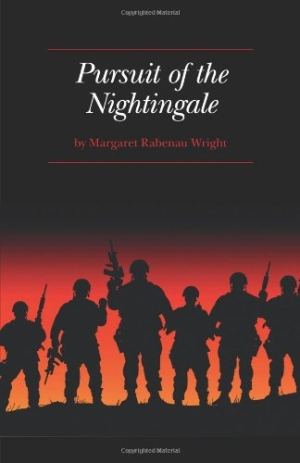
Pursuit of the Nightingale
Six wounded soldiers are separated from their unit in southern France near the end of World War II. Their nightingale is a young nurse, nicknamed “Buttons” by the soldiers, who works tirelessly tending to them. The twist? The soldiers are Americans, and the nurse is German.
In Pursuit of the Nightingale, the seven come together in a German field hospital where the Americans are mistakenly taken in during the confusion of battle. The medical staff gives the gravely wounded Americans minimal care until Buttons comes on duty. Her attention to their needs, as basic as a drink of water to the critical cleaning and bandaging of wounds, makes all the difference to the men: “Just watching her seemed to take their minds off their own misery and seemed to give them some hope.”
Lieutenant Andy Richards is the leader of this small band of soldiers, and he continues to take charge despite serious injuries to his head and leg. He is also strongly attracted to Buttons beyond just gratitude for her care. The romantic and sexual tension between the pair is handled well.
As the bond between the soldiers and their nurse begins to strengthen, Andy reflects that “maybe … just maybe with all their combined efforts, they might survive this hellhole.” They do more than that—the men and their nurse thrive and succeed. Buttons is determined to care for the wounded no matter their status, and the soldiers are determined to defend their young nurse when she is threatened. They are also intent upon getting back with Allied forces despite their serious injuries.
Margaret Rabenau Wright crafts a tale that is part war story and part romance. She does a fine job creating the main characters, Andy and Buttons, as well as the supporting cast of fellow soldiers, the French farmer and his wife, Andy’s parents, and those Andy meets after the war. The storyline is predictable, but there are enough twists and turns in the plot to help readers maintain interest. Wright also provides enough background details about the war front and post-war Germany to create scenes that can be clearly visualized and understood. However, though Wright’s writing skills are strong, the book is unfortunately marred by typographical errors.
The story behind the nurse’s nickname and the teasing among the soldiers are examples of the gentle humor Wright infuses into her novel. Such moments help ease the tension that is conveyed during war-time action, such as the devastating attack on the hospital, precarious situations Buttons finds herself in, and encounters with those who may be friend or foe. Andy’s frustrating but hopeful post-war activities bring the story to its happy conclusion.
Reviewed by
Mary Crawford
Disclosure: This article is not an endorsement, but a review. The publisher of this book provided free copies of the book and paid a small fee to have their book reviewed by a professional reviewer. Foreword Reviews and Clarion Reviews make no guarantee that the publisher will receive a positive review. Foreword Magazine, Inc. is disclosing this in accordance with the Federal Trade Commission’s 16 CFR, Part 255.
